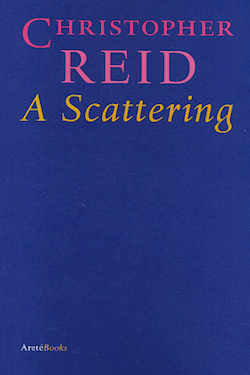A Scattering
by Christopher Reid
reviewed by Sarah Kafatou
Christopher Reid has been an editor (at Faber and Faber, and of the letters of Ted Hughes), and a poet known particularly for his whimsical use of the estrangement effect. With A Scattering, which was awarded the 2009 Costa Book of the Year Prize for the single best book of poetry or prose, he steps into the major leagues of poets writing in English.
The theme of this book is the illness and death of his wife, the actress Lucinda Gane, from cancer in 2005. It is perhaps the most moving such tribute to have been published in Britain since Douglas Dunn wrote, in his Elegies, of his wife’s death. Reid, like Dunn and like Philip Larkin before them, prefers no urgent, insistent rhetoric, no “rage against the dying of the light.” His poems are modestly understated, tender and unsentimental, their craft and deep feeling unobtrusive beneath a mildly humorous, entirely natural tone of voice.
The title poem, “A Scattering,” exemplifies those qualities. It begins by telling how elephants, coming upon the bones of another elephant somewhere in the savannah, “decide to do something about it.” But what can they do?
They can’t, of course,
reassemble the old elephant magnificence;
they can’t even make a tidier heap. But they can
hook up bones with their trunks and chuck them
this way and that way. So they do.
In another poem—the first in the book—Reid has invited his reader to compare our human mortality to that of any animal, such as the “scampering ants with their matching shadows / scampering under them.” When we come to the elephants, the scale and import of the comparison is poignantly magnified:
Their scattering has an air
of deliberate ritual, ancient and necessary.
Their great size, too, makes them the very
embodiment of grief.
Grief that is difficult to express. Reid recalls how Henry James “in his preface to The Altar of the Dead— / paragraphs I have read and re-read,” observed that others don’t want to hear about it. These elegies do the necessary work of bringing what is dark into the light, but they also evoke a life anchored in love and enjoyment. The poet is inconsolable; it is only upon second reading, perhaps, that one notices that the first word of the first poem is “Blessed” and “blessing” is the last one of the last.
Published on May 16, 2013

